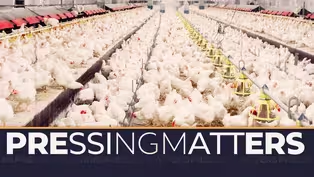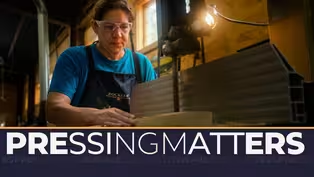Pressing Matters
Pressing Matters | Childhood Vaccines
Clip: Season 2 Episode 3 | 7m 4sVideo has Closed Captions
Childhood Vaccines
A new report shows measles cases are at their highest levels since the disease was declared eliminated 25 years ago. Jamie Mankiewicz explains the concerns around vaccinations and why it's not about pressure, but protection.
Problems playing video? | Closed Captioning Feedback
Problems playing video? | Closed Captioning Feedback
Pressing Matters is a local public television program presented by WCMU
Pressing Matters
Pressing Matters | Childhood Vaccines
Clip: Season 2 Episode 3 | 7m 4sVideo has Closed Captions
A new report shows measles cases are at their highest levels since the disease was declared eliminated 25 years ago. Jamie Mankiewicz explains the concerns around vaccinations and why it's not about pressure, but protection.
Problems playing video? | Closed Captioning Feedback
How to Watch Pressing Matters
Pressing Matters is available to stream on pbs.org and the free PBS App, available on iPhone, Apple TV, Android TV, Android smartphones, Amazon Fire TV, Amazon Fire Tablet, Roku, Samsung Smart TV, and Vizio.
Providing Support for PBS.org
Learn Moreabout PBS online sponsorshipOnce nearly eradicated, vaccine-preventable diseases are again showing up in Michigan clinics in classrooms.
Hi, and welcome to this edition of "Pressing Matters" here on WCMU, childhood vaccination rates are falling and a new report shows measle cases are at their highest level since the disease was declared eliminated 25 years ago.
Jamie Mankowitz takes a closer look.
- Initially, they did tremendous work to reduce and help almost eliminate a lot of vaccine-preventable diseases that caused thousands of children to become ill, hospitalized, die, and those that didn't have death, had long-term permanent disability.
That just never got better.
So again, very important to help us keep those diseases from coming back that used to cause such disastrous long-term health problems or death.
- [Jamie] Once routine, some parents are choosing to delay, question, or skip childhood vaccines altogether.
Here in Michigan, doctors are seeing the difference.
- So we've got 14, we got the diphtheria, tetanus, pertussis, polio, measles, mumps, rubella, chickenpox, hepatitis A, hepatitis B, hib, which is hemophilus influenza B, pneumococcal disease, rotavirus, and then influenza.
Over the last five or six years, our rates have dropped about five to 10% on average.
Some counties it's been less.
We've had some counties where it's been upwards of 15 to 20%.
So unfortunately, we have seen those rates dropping.
- [Jamie] At Mackinaw Trail Pediatrics in Cadillac, the shift is clear.
We spoke with Dr. Beth Alto, who says the patients are some of the most vulnerable.
- We're seeing a bigger decline in the newborns and the one-year-olds.
And I don't know if that's because people are planning to do it later, or if we have more parents of newborns that are hesitant on vaccines.
I don't know.
We'll see how that plays out.
- [Jamie] The reasons, sometimes it's access, sometimes it's anxiety, other times it's misinformation.
- Unfortunately, a lot of the information they may find is confusing, incorrect, sometimes it's just really harmful information.
So again, they just have questions about what's right to do and don't know who to ask or who to trust.
Some are really untrusting of the healthcare system or the government for different reasons, and that's spilling over into concerns about vaccinations as well.
- [Jamie] Experts say the key isn't just getting the information, it's knowing where it's coming from.
- People are coming to different decisions as what they feel is best for their individual child, but when they're getting misinformation, if they knew it was misinformation, that'd be one thing, but when you don't know, then you have to take it into your, you have to take it in, and it just really can feel anxiety about the whole process.
Many of our vaccines have been around for 60, 70, you know, years now.
We're going on the 1950s when we got the polio vaccine and the MMR, they've stood the test of time, but that doesn't mean that if you hear the wrong thing on the internet or from someone that you're not going to worry about it when this is your baby.
- [Jamie] What's at stake isn't just individual health, it's community protection.
Herd immunity is a promise to those who cannot protect themselves.
- So there is a vulnerable population out there that cannot do anything about it and really does depend on the rest of us.
- [Jamie] Chesney Reeves is a mother of three, ranging in age from 18 years to 18 months.
Her approach, education over confrontation.
- All of them are fully vaccinated based on the recommendations from their pediatricians.
For me, it was a no-brainer because I have seen, you know, the news reports and things like that of what these diseases can do.
Or if you talk to your grandparents about how scary polio actually was, I don't want my children to go through that.
And so it was never a question for me.
If I can prevent it, I will.
Yes, I'm doing the right thing.
Especially coming out of the pandemic, just knowing how quickly diseases can spread from child to child, from parent to parent, from person-to-person, it was really important to keep my children safe and also to keep other children safe.
- Nobody likes shots, especially kids, but the real problem comes when people skip them.
- We obviously just recommend that you follow the CDC schedule because that is very scientific research-based.
We can work with people too, you know, we can all achieve a common goal.
If we have a common goal, we can get there in different ways.
- [Jamie] Michigan's public health system is adapting, expanding walk-ins, after-hours access, and mobile clinics to meet families where they are.
The focus is not on arguments, but on empathy, science, and access.
- Nothing can quite replace an in-person conversation.
You know, I think that's where you build your trust and where you really just have time to sit down and talk.
Not just for this, for a lot of things, yeah, we like in-person.
And we like in-person visits 'cause we like to see kids.
- [Jamie] In Michigan, parents can request a medical waiver for required vaccinations if their child has a valid medical reason documented by a physician.
The waiver requires a physician signature on the state of Michigan's contraindication form, which you can obtain from the child's healthcare provider.
Non-medical waivers for religious or philosophical reasons are also permitted, but require an educational session with your local health department.
- So again, parents still have the right to not vaccinate their child if they feel that's what's best for their child.
But we're always here to provide more information if they want it.
- [Jamie] The message from doctors and other public health experts, if you're unsure, ask, they are ready to help.
- Person-to-person level, just making sure people want to be educated.
You know, sometimes people really don't want to know more.
You know, they may be hesitant, but don't want to have someone tell them what the right answer is at that moment.
And if that's the case, just letting them know, hey, if you ever wanna learn more, we're here for you.
You know, we understand you wanna do what's best for your child, but we don't wanna force facts on you if you're not ready for it but come back when you are, and just be careful about what information you read or, you know, take as truth.
- Thank you, Jamie.
Medical experts say the conversation around vaccines doesn't have to be about pressure, it's about protection.
For more information about vaccine schedules or waivers, contact your local health department or visit www.cdc.gov.
Pressing Matters | Marine Trades Institute
Video has Closed Captions
Clip: S2 Ep3 | 4m 31s | Marine Trades Institute (4m 31s)
Pressing Matters | Public Media Funding
Video has Closed Captions
Clip: S2 Ep3 | 4m 48s | Public Media Funding (4m 48s)
Providing Support for PBS.org
Learn Moreabout PBS online sponsorship
- News and Public Affairs

Top journalists deliver compelling original analysis of the hour's headlines.

- News and Public Affairs

FRONTLINE is investigative journalism that questions, explains and changes our world.












Support for PBS provided by:
Pressing Matters is a local public television program presented by WCMU


